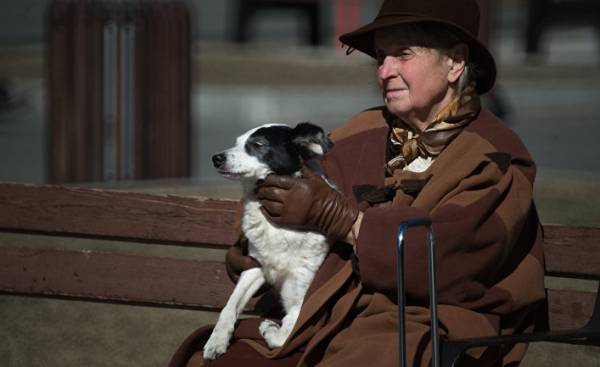
What’s it like to be old? Not a man, middle-aged, not elderly, but a representative of the fastest growing populations: people of the late elderly, 85 years and older? This question takes me a couple of years, and I wanted to write a novel about this man. We are familiar with the concept of “aging population”, but I’m really interested in the fact that the average life expectancy in the UK (as in many developed Western countries) is increasing every day more than five hours. Now I’m in my 30s and I will probably live to late old age. How much harder then my life is gonna be?
One day everything went wrong. My main character turned into a stereotypical old: irritable, not versed in computers and constantly wailing about his wife, who suffers from marasmus. Not wanting to leave him so miserable, I decided to invent for him a new sympathy for an eccentric old woman. She’s spunky, full of energy, loves to wear purple turbans and distributes brochures about safe sex.
In other words, I modeled his characters on two stereotypical notions of the elderly: a decrepit, depressed retired and forever young queer. One authoritative author for me after reading the draft said, “what else can you say about them except that they are old?” This greatly upset me, I withdrew into himself, beginning to ask the questions that need to answer for a long time, before starting the novel.
 © RIA Novosti, Ruslan Krivobok | go to fotoracconti the peoples ‘ friendship University (PFUR)
© RIA Novosti, Ruslan Krivobok | go to fotoracconti the peoples ‘ friendship University (PFUR)
First one: why I decided that I can realistically describe old age? I struggle to imagine the inner experiences of a person of the other sex, nationality or social status. Perhaps I assumed that if a man advanced in years read my book, it will simply be grateful that someone was interested in his life. He will be very happy and forgive me all the stereotypes.
The difficulty is that old age, unlike many other experiences of imaginary characters, sooner or later will affect everyone of us. For example, I can imagine what it’s like to be a man, but never know that for sure. Sarah Falkus, Professor of literature, once wrote about the work of Sally Chivers:
“Our attitude to age is changing more than to any other subjective experience… because we all will sooner or later age”
Let’s say my assumptions are confirmed and when I get old, my age will be either sullen and irritable or cheerful and eccentric grandparents. But that doesn’t mean that now I should show them that way. Of course, old age can be described as good or bad all depends on the author. Nevertheless, here you are unlikely to be accused of stereotyped, partly because “knowledgeable people” — those over 85 — have no cultural influence.
Stereotypes about the elderly, positive or negative, is very harmful. So says Lynne Segal, author of “Out of Time: The Pleasures and the Perils of Ageing” (running out of Time: the pleasures and risks of aging, 2013). She States that “the main problem of such people is not the age, and ageism — age discrimination”. It is impossible to form your personal perception of aging when we “age culture”, in the words of “criticism of the age” Margaret Morganroth Gillette, wrote a book called “Aged by Culture” (Aged by culture, 2004). In her opinion, there are only two of the accepted interpretation of aging: as progress or as decline. The same claims and Segal, an opponent of the “radical uncertainty”:
“We are forced either to grieve or to rejoice in the aging, instead of just accept it as a part of our lives”
Old age is hard to imagine, because there is no universally accepted definition. Usually with age changing view of the boundaries separating the phases of our lives. In 2009, the United States conducted a survey to find out how Americans perceive aging. Then it turned out that young people (between 19 and 29 years) believe that old age begins at 60 years. For people in middle age she comes in 70, for those older than 65 years to 74 years. As we get older, we feel younger than you really are: almost half of the respondents older than 50 said that feel at least 10 years younger. For those who are 65 years or more, this difference increases to 19 years.
The researchers also found that “there is a big difference between how you perceive old age young, middle-aged people, and what you say about yourself older Americans.” Young people are exaggerating the “negative effects” of aging (memory loss, diseases, lack of sex life), but older people do not feel the advantages of age (more time for travel, Hobbies, volunteering) to the extent in which they describe the first group.
Such differences in perception between generations are large enough and sustainable. Simone de Beauvoir in his exhaustive treatise ‘old Age’ (published in 1970, when she was 62 years old) wrote: “We with great difficulty perceive old age, because we believe it is something alien”. Barbara Myerhoff, an anthropologist, filmed a documentary “In Her Time” (“In her time”) about the company of older Californians. When she was in her 40s, she believed that “if it were not the elderly, then we were all ill and unhappy. Familiarity with them helps us to better know yourself”.
What is even more interesting that all of us experience old age differently. As expressed Germaine Greer: “Everyone ages differently”. The poet Fleur Adcock, who was 81, said:
“Young difficult to understand this enormous variety of possibilities and moods, it is difficult for us to solve”
Each of us has personality and a certain part of society, and those features which unite the elderly, is often exaggerated. British writer Penelope lively 82 years old and she writes that the people of this age “have nothing in common except the number of years lived, historical context, and a variety of diseases.” And at the same time adds that ageing is the most ordinary thing and do not act like nobody gets you.
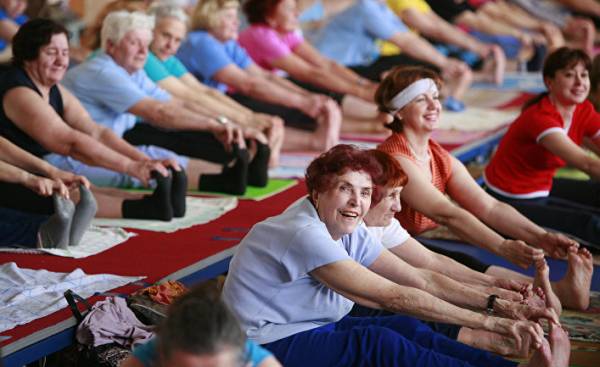 © RIA Novosti, Aleksandr Vikulov | go to fotobanka elderly doing Hatha yoga at the Academy of a healthy lifestyle in Stavropol
© RIA Novosti, Aleksandr Vikulov | go to fotobanka elderly doing Hatha yoga at the Academy of a healthy lifestyle in Stavropol
Actress Juliet Stevenson who is about 60, recently noted that over time, life becomes more interesting and complicated, but the roles that you suggest, become easier. The same can be said about how little gets good roles for older characters in literature. Lively believes that people often imagine an old person “or God’s dandelion, or grouchy, irritable, rude”. According to her, in fiction, stereotypes are common, and, in all probability, the literature responsible for this typical picture of old age. Few authors are able to change it.
I’m starting to realize that creating an image of a perky old lady in his novel, I idealized the type of an elderly man who “goes forward”, and it is possible that it is this I want to be in old age. At that time, I remembered the famous poem by Jenny Joseph “Warning”. It describes how a young woman dreams about getting old when you can do whatever you want, and don’t need to be discreet and serious. I’ve never been a rebel, so why do I think that in old age I suddenly have a desire “to throw off the shackles of decency”?
Sociological literature about what life was like in the 70s, 80s and 90s proves that what we shall be in old age depends greatly on what we were in youth. We like the idea that the identity of the person with age does not change and sometimes it is very difficult to realize his aging. For example, when Z. Freud was 63 years old, he saw in the train an elderly gentleman and realized with horror that it was his reflection, and British biologist Lewis Walpert said with sadness: “I 17-year-old could soon be the 81-year-old?” However, this proves our ability to maintain friendly relationship with a young version of myself. “Live easily and smoothly”, as in the poem Stanley Kunitz. He knew exactly what meant: the title of poet laureate of the United States (the official poet of the Library of Congress — approx. Newочем) was given to him at the age of 95 years.
I imagined that old age is the logical conclusion of life’s journey, time to get your Affairs in order. Then I took into account the fact that elderly people are not alien to the mess, not to mention the accidents, the vagaries and failures. The logical conclusion may be typical of literature, but in life all differently. Helen small writes in his work “The Long Life”, where we study the phenomenon of old age in psychology and literature:
“only by refusing to perceive life as a complete story… you can avoid that it will be similar to the tragedy”
Lively talks about how life is perceived in old age: “the Writer in me (as the reader) tries to find the form, the structure of the story, ending, main idea, moral. All, I have a set of different episodes. Some I like, others not, broken chronology, there is no structure.” Reading stories from the collection “Stone Mat” Margaret Atwood (she is now 75), I started to think about what will be in old age. As noted by one critic, the history of Intwood represent “the hatred that a person can accumulate a years.” Many of her characters prefer revenge to reconciliation.
 © AP Photo, Efrem LukatskyПожилая woman selling home-made products in Kiev
© AP Photo, Efrem LukatskyПожилая woman selling home-made products in Kiev
Among people of my age I’m not the only one who falls into the trap of stereotypical thinking. A friend of mine, who is studying in medical school, was recently chosen specialty — geriatrics (branch of medicine devoted to the treatment of people of elderly and senile age — approx. Newочем) and once asked her why. She said, “Because I like old people. I love listening to their stories, I wonder what they can tell about the world.” Then one of her friends said, “What the hell, old people are exactly the same people, differing only in their number of past years.” My friend had carefully studied geriatrics, but realized that she had an idealized picture of the elderly. Then she told me: “In the end, they too can be unbearable, rude, ungrateful.” This has influenced work with patients, we had to constantly overcome an instinctive tendency to sympathize with those who are older. In this she is in solidarity with Kate Rossiter, who in his scientific work speaks of the superiority of “ethical responsibility” on compassion in medical practice. As said my friend, “sympathy is something bad, because it is based on the assumption that we can somehow compare with the other person. Polite and reasonable restraint is the basis of competent approach to treatment.”
Literary critic Frank Camrod wrote that “young people know absolutely nothing about old age and all their attempts to explain anything are blind”. Perhaps that is why many young creators often follow the same path: we often tend to portray old age as one big, fun, wisdom-filled adventure as in the movie “Old grumblers” or in the novel (and later film) “a Hundred years and a suitcase full of money in the bargain” (one critic decided to combine those movies in the genre of “old people hilarious acting”). The other extreme is a psychological drama, which can be called “elderly people are awful”. Here belong such novels as “the Farm”, “Elizabeth is missing”. The films “iris”, “the Iron lady” also fall into this category. Says Sally Chivers in the movie “The Silvering Screen: Old Age and Disability in Cinema” (Blue screen: the elderly and the disabled in cinema, 2011), “understanding public… advanced age is always accompanied by characteristic beliefs about disabilities”.
Of course, there are exceptions, and a lot of them. Lynn Segal warns of the negative impact of stereotypes about old age. She admires the work of Julian Barnes. In her opinion, despite the youth of the writer, he has an extraordinary ability to portray the elderly. Maybe it is his “thanatophobia”, mentioned in his memoirs under the title “Nothing to fear” (published when the writer turned 62 years); death for him is worse than old age. The same can be said about the characters in his novels, such as “Staring at the sun” (at the time of publication the author was 40). The characters-old men, according to Segal, “absolutely calm attitude to his age”. In the same way Barnes manages to portray the indifference of many elderly people to death; as he wrote lively,
“many of us, coming to the finish line, too busy with the load of the years and not spend time waiting for the last line”
Scottish writer Muriel Spark also got a lot of good reviews from writers of advanced years. Among them lively and her boyfriend, the English novelist Paul Bailey. They believe that the Spark failed to reliably represent the internal world of the elderly person. She was only 41 years old when he published the novel “Memento Mori”. It’s a black Comedy about how a nursing home I received phone calls, and an unknown voice announced ominously: “remember, death is no escape”. Lively appreciate this novel for the “company of vivid characters, convincingly old, suffering from unexplained illnesses, concerned only with its past.” V. S. Pritchett in the introduction to the publication “Memento Mori” in 1964 praised the Spark for the “disclosure of the subject which in society they avoid to mention the human age.”
A more recent example is the debut novel of a 37-year-old Australian writer Fiona McFarlane’s “the Night guest”, published in 2013. The protagonist of the novel, Ruth, suffers from dementia, but despite this and thanks to the kindness of nurses, able to see the surrounding beauty and to have fun — for example, through sexual contact — but, at the same time, she equally enjoys and suffers from the memories of his unusual past. She is not experiencing joy, but not afraid. MacFarlane admits that during the writing of the novel, she represented Ruth as “a 75-year-old man, who combines years of experience, memories, opinions, prejudices, decisions and desires.”
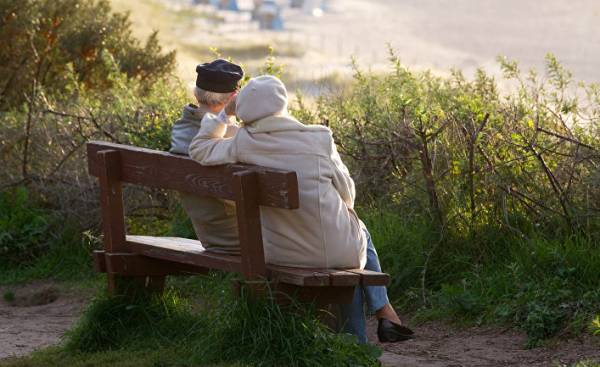 © Fotolia / DOC RABE MediaПожилая pair
© Fotolia / DOC RABE MediaПожилая pair
But why look for the description of old age in young writers, when instead I should study the stories of older people? I don’t mean a rich selection of works of middle age authors who usually write more about the fear of aging than of old age (e.g., the novels of Martin AMIS or the poetry of Eliot). I’m talking about works written by authors older than seventy-five years.
I was beginning to think that besides the well-known examples as Saul bellow (whose latest novel “Ravelstein” was published when he was 85), Thomas Mann (deceased at the age of eighty years and who claimed that old age is the best time to be a writer), may Sarton (so-called “American poet laureate of aging,” who died in ‘ 83) and John Updike (who died in 76 and in his final collection of stories written: “before the age of eighty years, I sometimes see myself from the outside as a person I know, but not especially close”), the selection is quite scarce. After the publication of “Ravelstein”, the biographer of Saul bellow wondered: “What other great writers have done something like this in eighty years?”
Frank Kermode summed up the problem:
“Those who really know the old age is most likely dead or very tired, or just don’t want to discuss it with smart young people”
For example, Philip Roth, who is now eighty-two, decided to leave the literature in seventy-eight, after the publication of a cycle of novels “Nemesis”, admitting in an interview about the novel: “I don’t want to read, don’t want to write, don’t even want to talk about it… I’m tired of all this work. Now I’m at another stage of life.”
But if you dig deeper, open to other perspectives, other opinions appear. I selected examples that may seem peculiar and chosen for the sake of a witticism, is of older writers, all over seventy-five, but still able to think clearly. However, their view on old age may be able to dispel some of the misconceptions and fantasies of people like me, not yet to reach this stage in life. Each of the following three authors alive and still publishes a large number of works, they were kind enough and agreed to answer some of my questions via e-mail.
The first of them is 78-year-old British writer Paul Bailey, who published her first novel “Jerusalem” in thirty years. The product allows you to learn more about the society of older people. The main character, faith, is a woman over seventy, which Bailey, in his words, deliberately did not “cute or lovely”, as I didn’t want to engender pity. “I can’t begin to tell you how at that time looked down on the elderly and how stereotypical they were perceived: it was fashionable to look down” — he admitted to me. Critics wondered why the young man is going to write about the old man in his first job, but Bailey admits that he drew inspiration from two other debut novels by young writers, which also describes old age: “Fair in the poorhouse” Updike (1959) and “Old boys” by William Trevor (1964). Bailey believes that his view of old age was based on real experiences and observations, as his parents were aged when he was born, and Bailey was brought up by an elderly couple. “I grew up among people who were already in years, so old age has never been for me an unpleasant surprise,” he admits. “I never believed that seniors are somehow different”.
He remembers the lessons of MIME, which attended when he studied acting at the Central school of London in the mid-fifties.
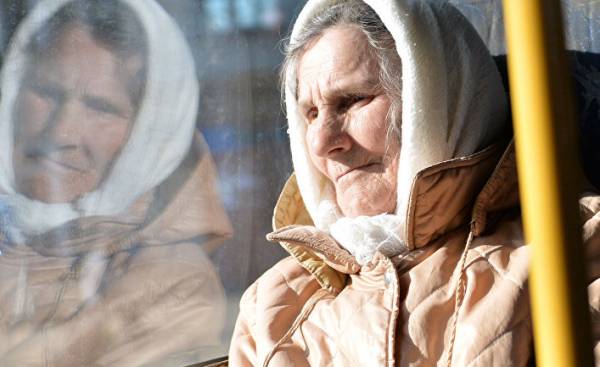 © RIA Novosti, Alexey Maligawa | go to fotobanka woman
© RIA Novosti, Alexey Maligawa | go to fotobanka woman
“We had to portray older people. Most students believed that it was sufficient to be bent and shuffling feet. No one I know that older people are not moved this way, especially my formidable grandmother. It was a parody,” says Bailey.
He believes that not much has changed. “I meet a lot of sentimental rubbish written about “the plight of elderly people”” — he wrote in the Preface to the article in the Guardian, in which he selected the top ten works about old age (he praises the work of Isaac Bashevis singer, Alice Munro and Stefan Zweig, among the reader comments to the article you can also find good recommendations). And sentimentality can be fatal. In an interview with the Paris Review Nobel laureate kenzaburo OE, who is now 80 years old, mentions the warning Flannery O’connor:
“She said that sentimentality is the position in which you’re not telling the truth. To spare people with disabilities is the same as hide them”
Bailey confessed to me that, in his opinion, some of the best descriptions of the elderly “can be found in books and plays, which do not describe the aging deliberately. He refers to the memoirs of Sergei Aksakov, Maxim Gorky, Leo Tolstoy, and the works of Balzac, Proust, Turgenev, Dickens and Eliot, where “the old men appear and disappear” — such as “tender” portrait of an elderly parent of Wemmick in “Great expectations”.
In 2011, Bailey published the novel “Ulysses Chapman”, whose protagonist, an elderly man, lying in the hospital, where his visit of real and imaginary people: lovers, dead parents, the characters of the books. Bailey was inspired by his long stays in hospitals, he enjoyed them “a little perverse way, as someone who eats oatmeal for Breakfast with anchovies” due to the interesting people I met there. Although the novel and tells the story of the old age, he admits he felt younger in the process of writing. Bailey helped me to determine what went wrong in my imaginary attempt, when he said: “I never, never thought I struggled with the “problem” of old age. It was never a problem for me. It’s just another stage of life.”
The second author, who shared his thoughts with me — Fleur Adcock. If poetry, as Auden wrote, “can be defined as the clear expression of mixed feelings”, it is just suitable to describe the mixed feelings of the elderly to old age. A native of New Zealand, British poet Fleur Adcock has published the debut collection, when she was thirty. She is now eighty-one. Like lively, she admits that for her old age began in the seventy-years old when she became seriously ill, though
“more honest, but less satisfactory answer may be that it is a gradual process, during which age retreats and comes unpredictable for many years”
Adcock remembers how it was unusual to feel it in the eighth decade of life, when she endured Yates, who died at the age of 73 years, who was considered “the old poet”.
In his recent book “Glass wings” (2013), she paints a very shocking picture of old age. Its old heroes versed in new technologies, but use them for their own purposes. In the “Match Girl” the narrator asks her younger sister:
But like someone younger than me can
To suffer from osteoporosis
And to search the Internet for cure for necrosis?
In “graduate Notes” the narrator regrets old high school friends are either dead or suffering from dementia, and then transferred to the present:
Faded photo. But Mary and I
Skype are alive
Picture color and movements full:
Sepia turned.
“Mrs. Baldwin,” the narrator describes the “dim” a pang of envy every time you hear that someone was diagnosed with cancer. In the poem “Sex with dead people,” she recalls past lovers:
Eyes of the dead look deep into you
And well cover the trunk,
What flesh was once, and now
But ash — powdered chemical.
Adcock has long been familiar with Jenny Joseph, author of “Attention,” and admits that she was “fed up” with his famous poem, written in the days when she was still a young girl and imagined old age (“When I grow old, I shall wear purple/With a red hat which doesn’t suit me”). Joseph now over 80, but she still writes poetry. Her recent poem “Patient old cripple” it’s a great contrast with the rough tone earlier “Warnings” ending with the lines: “I curse the world that has misjudged me, and it hurts/But you know/It’s not the best we can do.”
The third writer, with whom I talked, — vosmidesyatniki Penelope lively, who released his debut book in 37лет and, being young, are also often depicted the elderly characters in their works (for example, in “Moon tiger”, for which she won the Booker prize in 1989). In her latest novel, “How it all began” (2011) describes the chain of random, but important events in people’s lives caused by the hip fracture is the main character, an elderly woman. Currently, lively is working on a series of short stories, many of which are older characters.
Lively also shares her experience of an elderly person in his memoirs, “Ammonites and leaping fish: a life in time”, released in 2013. This is not a traditional recollections, and reflections about old age and memory. She is proud of their right to speak about such things.
“One of the few advantages of age is that you can talk about it with some authority. You are going through it now and know what’s going on,” she writes, but also emphasizes the importance of calling — “our experience is unknown to most people, we are the pioneers”
Lively like the anonymity that retirement has given her. It allows “free to do what writers do anyway, is to listen and watch, but with a small sense of what it is — a time traveler”.
Penelope lively is one of the first true anthropology of old age: as a participant and observer. Her behavior can seem almost unimaginable to the young: for example, it does not envy us all the same curious way as before; doesn’t miss the travel or the holidays; used to physical pain; she still has a “need and greed” (muesli with yoghurt from sheep’s milk, a daily “dose” of reading), but its more “selfish” desires disappeared. The amazing thing is that lively insists that old age is not some kind of “pale” and she’s still capable of “near-luxury perception of the world.”
For me it is a contradiction in terms that sounds both wonderful and scary. But perhaps it is this ambiguity, in her opinion, is the cause of the “rarity memorable and successful works of old age… This is a danger zone for many novelists”. She highlights a book Kingsley AMIS, “the End” for the rejection of stereotypes about the elderly, while calling it “a fun book with a dark undertone” and the trilogy Jane Gardam (she began writing when she was over seventy, and finished recently, already eighty-year old woman) Old Filth (“Old filth”), The Man in the Wooden Hat (“the Man in the wooden hat”) and Last Friends (“Last friends”).
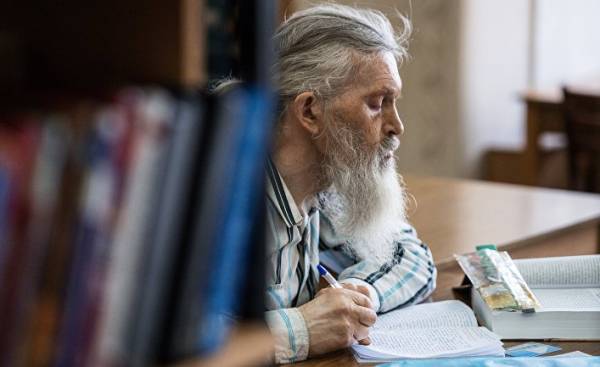 © RIA Novosti, Alexey Maligawa | go to fotomonster in the universal hall of the Omsk state regional scientific library named after A. S. Pushkin
© RIA Novosti, Alexey Maligawa | go to fotomonster in the universal hall of the Omsk state regional scientific library named after A. S. Pushkin
Lively hopes that people will be more interested in old age, and believes that young people believe old age “more interesting than frightening”, in particular, for the reason that now this group of the population “is much more adapted than… older people in the past. We have changed and part of us can remain in the 1950’s, but our worldview much pocacola of 2015”. “The gap between generations decreases, which was not when I was young,” she says. But when I asked her about the moral obligations of young authors in the depiction of old age, she replied:
“You as the writer should think: “does my imagination to make a quantum leap?”. If in doubt, do not start. Stereotypes — a kind of literary insult”
To the question, what, in her opinion, she was wrong in his youth, when he wrote about the elderly, lively said that was not able to imagine such a noticeable physical aspects of old age: constant pain from various forms of arthritis, slow the deterioration of vision and hearing and “slight instability”, loss of balance, “which would be frightening, if it came suddenly, but since it happened gradually, you used to”. “With the old character of “Moon tiger” (written when lively was already over 50), Claudia, I plunged into the problem… focusing on her mind, not the body — it dies in the hospital, but about it not so much has been said — you only know her thoughts and memories.” She believes that there is a right, but a way of thinking Claudia in old age is the same as in his youth; it was her own experience of ageing.
Why literature on old age is so important? The best thing on this question, perhaps, answered John Halliday, editor of a collection of poems on the theme of old age “don’t bring me a rocking chair” (a name taken from a poem by Maya Angelou): “Who makes the decisions when it comes to aging?” According to Holliday, is the power of poetry, which provides us with “fresh eyes” on old age, which is very important. “Literature has the potential to give us texts in which the “life experience gradually accumulates, as in a spiral, in a narrative that rarely boils down to just age,” agrees Lynn Segal, and Sarah Falkus writes: “Literature is not just reflects and represents society, on the contrary, it is part of it and involved in the formation of society.”
For its part, I’m not sure I’ll be back to his novel. Now it is a way for me to brag: look at me, so young and working, imagining old age! I think I prefer to watch and learn as the works of “old age” continue to grow in quantity and quality, and to listen carefully to the artists, who, as Julian says Barnes, because of old age, “has enough confidence to just speak”. Forget novels of education. We stand on the threshold of an era “novels about old age” (a term introduced by the literary critic Barbara Frey Waxman).
Everywhere I look, I stumble upon new works written by older people, personal creative opinion of many subcultures of old age, and I am ashamed that I had not paid attention to these works. My list of books to read now includes: stories 96-year-old Emir Humphreys, late of the work of Doris Lessing, chinua achebe and Seamus Heaney, the poetry of Elaine Feinstein, Danny ABSA, Maureen Duffy and Ruth Fanlight, a new novel by 73-year-old Erica Jong “Fear of death”, the works of William Trevor, David Lodge, Kent Nabatiyah, Toni Morrison and kenzaburo OE, the memoirs Vivian Gornik, Roger Angell and Diane Athill. This is a great opportunity to get acquainted with a new human experience — a long life, described the elderly, those who have become wiser with age. And as said the deceased poet Adrian rich: “In a year when I turned 80, fear and beauty in me in harmony”.







